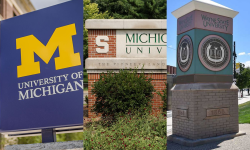Opinion | While we have the cash, let’s boost Michigan’s college scholarships
Michigan lawmakers currently have an enviable historic opportunity to strengthen the state and protect its future.

They have an astounding $11 billion that is available for allocation, courtesy of federal COVID relief dollars and a windfall of recurring state revenues. This presents an unparalleled opportunity to invest in Michigan’s residents and workforce in a manner that will ultimately benefit our families, communities, employers, and our overall economy.
A state’s physical infrastructure is important; so is its talent infrastructure. Roads and bridges, underground water infrastructure and internet connectivity are all important assets to a state and should be included among lawmakers’ priorities for investment.
Investing in the state’s workforce talent infrastructure is also crucial. A highly skilled workforce is the top business attraction and retention asset in any state’s arsenal. The unique thing about this moment is that there’s plenty of money available to make a sweeping set of investments that will positively impact our state. State lawmakers don’t have to jettison investments in one set of state priorities at the expense of others given the circumstances.
Moving forward, Michigan’s economic development strategy must be one that involves investing more in our people and our communities, rather than one that emphasizes tax giveaways. If we are to attract, let alone retain, major company headquarters, as Michigan Future Inc.’s Lou Glazer writes, we must dramatically retool our economic competitiveness arsenal to one that appropriately balances both workforce talent and tax incentives.
A $400 million investment in the Michigan Competitive Scholarship is an exceptionally good use of the billions of currently unallocated dollars – and will benefit students enrolled in all of Michigan’s public and private two- and four-year colleges and universities
A $400 million infusion in state financial aid is a foundational recommendation from the 2018 statewide higher education attainment roundtable report, Total Talent: Equipping All Michiganders with the Education and Skills Needed for Success in the Economy of Today and Tomorrow.
The report was embraced by a wide spectrum of stakeholders spanning the state’s K-12 education, business, non-profit, philanthropic, and higher education communities. The Michigan Competitive Scholarship, currently only funded at $30 million, is available to those who meet the eligibility criteria from among the 600,000 students collectively enrolled at Michigan’s public and independent, non-profit two- and four-year institutions, providing students with a portable choice in where and how they want to further their education.
Michigan demonstrates the lowest investment of state funding for student financial aid in the nation. Michigan is last in the nation in state funding of financial aid for students attending public institutions, per the annual State Higher Education Finance report, produced by the State Higher Education Executive Officers Association. Michigan is only one of two states that also uses federal dollars (Temporary Assistance for Needy Families) to fund its financial aid programs.
Even when including these dollars, Michigan ranks 38th in the nation for all financial aid grant dollars per state population (immediately behind Mississippi) based on the latest annual survey data from the National Association of State Student Grant & Aid Programs.
The same survey shows that state need-based grants in Indiana, Minnesota, Texas, and elsewhere have maximum awards over $10,000, while the Michigan Competitive Scholarship tops out at $1,000. Indiana alone spends over $100 million more per year on their flagship financial aid program than Michigan does on its competitive scholarship program. We can and must do better if we are to have a workforce that can compete both domestically and internationally.
Recent state investments toward associate degree attainment are commendable; it’s now time to focus on boosting bachelor’s degree attainment. State lawmakers’ funding support for the Michigan Reconnect ($85 million) and Futures for Frontliners ($49 million) financial aid programs is to be commended. The programs provide Michigan residents with tuition assistance toward earning an associate degree from one of Michigan’s 28 community colleges.
Attention should now turn to increasing financial aid to help more Michiganders earn a bachelor’s degree. The return on investment of a bachelor’s degree is considerably larger. Michigan’s own labor market projections also tell the story. Thirty-eight of the top 50 high-pay, high-demand occupations through 2028 will minimally require a bachelor’s degree.
Expanded eligibility to benefit more Michiganders. There are some refinements that can be made to make the scholarship’s academic achievement and financial need eligibility criteria more equitable and accessible to more students from lower- and middle-income households. A minimum high school grade point average or a student’s high school class rank are additional, alternative measures to the SAT that can assess the merit component of the scholarship’s eligibility.
The financial need criteria could be changed to be based on a simple metric, such as 150 percent of the state’s median family income. Together, these changes would make increased state funding for the scholarship program more widespread, with the dollars following students wherever they enroll.
This invigorated investment in the Michigan Competitive Scholarship program would chart a new path for the financial aid Michigan provides to college students who represent the state’s next generation of talent. It is an investment that will increase the economic prosperity of more Michiganders, of communities, and of the state in its entirety.
At a time when Michigan has record revenue available to redefine what talent and economic development means, an overhaul of the Michigan Competitive Scholarship is one of the best possible uses to make a transformational change in our state’s trajectory.
See what new members are saying about why they donated to Bridge Michigan:
- “In order for this information to be accurate and unbiased it must be underwritten by its readers, not by special interests.” - Larry S.
- “Not many other media sources report on the topics Bridge does.” - Susan B.
- “Your journalism is outstanding and rare these days.” - Mark S.
If you want to ensure the future of nonpartisan, nonprofit Michigan journalism, please become a member today. You, too, will be asked why you donated and maybe we'll feature your quote next time!




